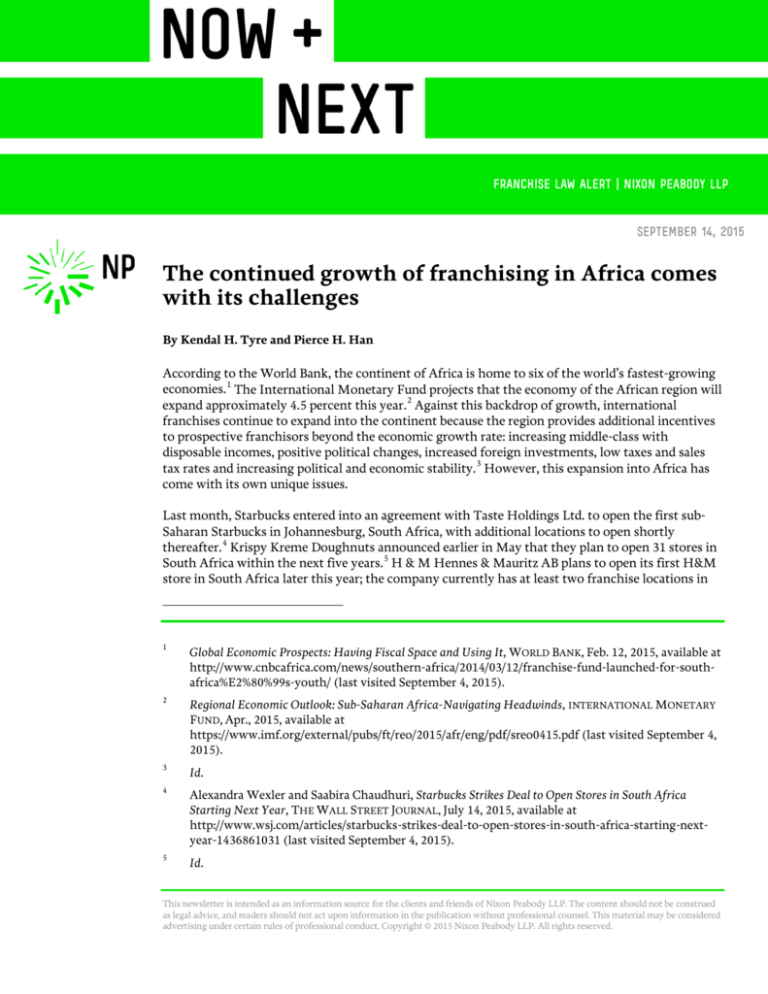
Franchise Law Alert | Nixon Peabody LLP
September 14, 2015
The continued growth of franchising in Africa comes
with its challenges
By Kendal H. Tyre and Pierce H. Han
According to the World Bank, the continent of Africa is home to six of the world’s fastest-growing
economies. 1 The International Monetary Fund projects that the economy of the African region will
expand approximately 4.5 percent this year. 2 Against this backdrop of growth, international
franchises continue to expand into the continent because the region provides additional incentives
to prospective franchisors beyond the economic growth rate: increasing middle-class with
disposable incomes, positive political changes, increased foreign investments, low taxes and sales
tax rates and increasing political and economic stability. 3 However, this expansion into Africa has
come with its own unique issues.
Last month, Starbucks entered into an agreement with Taste Holdings Ltd. to open the first subSaharan Starbucks in Johannesburg, South Africa, with additional locations to open shortly
thereafter. 4 Krispy Kreme Doughnuts announced earlier in May that they plan to open 31 stores in
South Africa within the next five years. 5 H & M Hennes & Mauritz AB plans to open its first H&M
store in South Africa later this year; the company currently has at least two franchise locations in
1
Global Economic Prospects: Having Fiscal Space and Using It, WORLD BANK, Feb. 12, 2015, available at
http://www.cnbcafrica.com/news/southern-africa/2014/03/12/franchise-fund-launched-for-southafrica%E2%80%99s-youth/ (last visited September 4, 2015).
2
Regional Economic Outlook: Sub-Saharan Africa-Navigating Headwinds, INTERNATIONAL MONETARY
FUND, Apr., 2015, available at
https://www.imf.org/external/pubs/ft/reo/2015/afr/eng/pdf/sreo0415.pdf (last visited September 4,
2015).
3
Id.
4
Alexandra Wexler and Saabira Chaudhuri, Starbucks Strikes Deal to Open Stores in South Africa
Starting Next Year, THE WALL STREET JOURNAL, July 14, 2015, available at
http://www.wsj.com/articles/starbucks-strikes-deal-to-open-stores-in-south-africa-starting-nextyear-1436861031 (last visited September 4, 2015).
5
Id.
This newsletter is intended as an information source for the clients and friends of Nixon Peabody LLP. The content should not be construed
as legal advice, and readers should not act upon information in the publication without professional counsel. This material may be considered
advertising under certain rules of professional conduct. Copyright © 2015 Nixon Peabody LLP. All rights reserved.
the continent. 6 Domino’s Pizza has already opened 45 locations in South Africa since late last year. 7
Other brands entering or already in the country include Pizza Hut, Gap and Zara. 8
The popularity and impact of the franchising industry in the African continent is self-evident.
However, there are still many challenges.
Intellectual property
A basic understanding of any franchise arrangement is that the intellectual property of the
franchisor is licensed to franchisees for a limited time and under certain terms and conditions. To
protect its intellectual property, the franchisor reserves sweeping rights in its franchise agreements
with its franchisees. The “rule of law” is critical to maintaining and protecting property. Without
the franchisor’s ownership of its intellectual property, the franchisor would have no interest in
teaching a potential competitor its proven trade secrets.
Concerns over the weak protection of intellectual property in Africa have been expressed by several
brands, such as McDonald’s. 9 McDonald’s is in countries such as Egypt, Algeria and South Africa,
but Kenya, for example, for several years did not meet that particular franchisor’s market entry
criteria regarding the protection of intellectual property. Moreover, examples of recent court
decisions underscore the fact that intellectual property expertise varies in Africa. 10
Capital
Capital is another worry. Franchisors generally request franchisees commit over 50 percent of the
total investment, but African banks are cautious lenders to SMEs and start-ups. 11 However,
6
H&M Worldwide, H & M HENNES & MAURITZ AB, May, 2015, available at
http://about.hm.com/en/About/facts-about-hm/fashion-for-all/sales-markets/hm-worldwide.html
(last visited September 4, 2015).
7
Wexler and Chaudhuri, supra note 4.
8
Id.
9
Sarah Rundell, More Chains for Africa, AFRICA INVESTOR, Mar. 1, 2010, available at
http://www.africainvestor.com/article_mag.asp?id=6490&magazineid=36 (last visited September 4,
2015).
10
In Mega Power Centre CC t/a Talisman Plant and Tool Hire v. Talisman Franchise Operations (Pty)
Ltd., a Namibian company, which was a franchisee of a South African company, provided large,
“operator-intensive” tools and equipment to the Namibian building industry under the name
“Talisman Tool Hire” for a number of years. When it discovered that a South African company
intended to start a business with smaller, “non operator-intensive” tools under the name “Talisman
Hire,” the Namibian company sued for “passing off.” Passing off is a common law action. To
maintain a suit for passing off, the plaintiff does not need to have a trademark registration. Instead,
the plaintiff must establish: (1) that it enjoys a reputation or goodwill in a name; (2) that the other
party is, through the use of a similar name, misrepresenting that there is a connection with
plaintiff’s business; and (3) that plaintiff is likely to suffer damages. The Namibian judge, relying
heavily on South African law, determined that no passing off had occurred despite the strength of
common law decisions in favor of the plaintiff and the strength of the Talisman name. This case
emphasized the need for companies to register their marks in Africa. Had the plaintiff been able to
rely on a registered trademark instead of a common law claim for “passing off,” the outcome would
have likely been different. See Ilse Du Plessis, Edward Nathans Sonnenbergs, South Africa:
Namibian IP Case Highlights Pitfalls In Africa, MONDAQ, July 29, 2013, available at http://www.
mondaq.com/x/254536/Trademark/Namibian+IP+Case+Highlights+Pitfalls+In+Africa.
11
Franchise Fund Launched for S. Africa’s Youth, CNBC AFRICA, Feb. 12, 2015, available at
http://www.cnbcafrica.com/news/southern-africa/2014/03/12/franchise-fund-launched-for-southafrica%E2%80%99s-youth/ (last visited September 4, 2015).
reforms in the African banking industry are changing the lending landscaping. Local banks in
Kenya and South Africa now have franchise departments and are starting to look at franchising not
as a business start-up, but as a support system for business enterprises that may merit a closer
inspection. 12
Another initiative addressing the financing concerns of franchisees is the Franchise Fund,
originally launched in 2014 and backed by the Development Bank of Southern Africa. 13 It is aimed
at young and disadvantaged entrepreneurs with limited access to capital and assets to qualify as
franchisees. Franchisee applicants are required to undergo a thorough screening process and
complete a formal training program. 14 In addition, the franchisee must provide a minimum
contribution of ten percent of the total financing requested. 15 Only those franchisors that are
members of the Franchise Association of South Africa and comply with certain other minimum
requirements can participate in the Franchise Fund program. 16 The Franchise Fund has been
allocated 107 million rand [approximately US $7.9 million]—comprised of 48.65 million rand
(approximately US $3.6 million) from South Africa’s National Treasury’s Jobs Fund (38.92 million
rand allocated for financing and 9.73 million rand allocated for technical assistance) and 58.38
million rand (approximately US $4.3 million) from Business Partners Limited, a specialist risk
finance company for SMEs in South Africa. 17
Supply chain
Supply chain issues present yet another challenge. Although much of the franchise activity is
present in South Africa, many international franchisors have used the country as a springboard into
the rest of the region and continent, including Namibia, Zambia and Botswana. 18 Many of these
franchisors have developed “integrated strategies” for expansion such as acquiring their own local
logistics and supply chain businesses to ensure control over the supply chain and to provide
consistent customer experience. 19
Many other sub-Saharan African countries are still in the early stages of supply chain development
and this may cause problems for some franchisors. 20 African franchisees are required to maintain
adequate supplies of the products that fuel their businesses and those products must also meet the
franchisor’s particular quality standards. For example, KFC and other fast food brands require
adequate supplies of chicken that meet their standards. 21 This may be difficult in certain African
12
Rundell, supra note 9.
13
CNBC Africa, supra note 11.
14
Id.
15
Id.
16
Id.
17
Id.
18
Mthulisi Sibanda, SADC Franchisors Devise Strategies to Enhance Growth, CAJ NEWS AFRICA, July 29,
2015, available at http://cajnewsafrica.com/2015/07/29/sadc-franchisors-devise-strategies-toenhance-growth/ (last visited September 4, 2015).
19
Id.
20
Tielman Nieuwoudt, Think Juba Not Jacksonville—Supply chain trends in Africa, HOW WE MADE IT
IN AFRICA, Aug. 14, 2013, available at http://www.howwemadeitinafrica.com/think-juba-notjacksonville-supply-chain-trends-in-africa/29094/ (last visited September 4, 2015).
21
Alex Park, How Bill Gates is Helping KFC Take Over Africa, MOTHER JONES, Jan. 10, 2014, available at
http://www.motherjones.com/environment/2014/01/kfc-africa-chicken-usaid-gates-foundation
(last visited September 4, 2015).
countries where the supply of chickens from local chicken farmers fails to meet the franchisor’s
criteria for not only food safety and security but also quality and quantity. 22 For example, South
African KFCs sell almost 10 percent of the nation’s commercially grown chickens. 23 In these
instances, local franchisees are required to purchase their supply from outside the country from
franchisor-approved suppliers. 24 To ensure adequate supply needs are met and to cut costs, some
franchisors are working with their franchisees to secure local suppliers. 25
Franchising in Africa is not without its challenges. Whether faced with weak intellectual property
protection, a lack of franchisee capital or shortcomings in the supply chain, it is imperative that
prospective franchisors and franchisees perform a thorough due diligence on the legal and business
environment before proceeding into a franchise relationship to ensure a successful arrangement.
For more information on the content of this alert, please contact your Nixon Peabody attorney or:
— Kendal H. Tyre, 202-585-8368, ktyre@nixonpeabody.com
— Pierce H. Han, 202-585-8139, phan@nixonpeabody.com
______________________________________________
Parts of this alert were based on excerpts from Franchising in Africa 2014: Legal and Business
Considerations, a book edited by Kendal H. Tyre and Diana V. Vilmenay-Hammond. This 400-page
book reflects the work of more than 30 experts in the field. It is the first in a series of books on
international franchising published by LexNoir Foundation. The second book in the series is
Franchising in Asia 2015: Legal and Business Considerations.
Click here to view a video book trailer of the publication— Franchising in Africa 2014.
22
Id.
23
Id.
24
Dinfin Mulupi, KFC Expects More Global Fast-Food Chains to Enter the Kenyan Market, HOW WE
MADE IT IN AFRICA, July 24, 2012, available at http://www.howwemadeitinafrica.com/kfc-expectsmore-global-fast-food-chains-to-enter-the-kenyan-market/18698/ (last visited September 4, 2015).
25
Id.



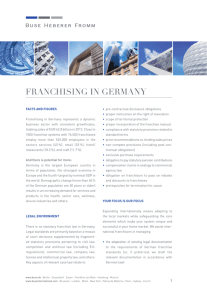


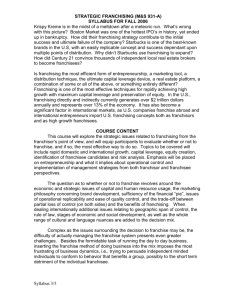
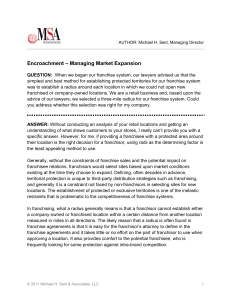
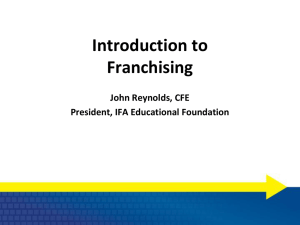

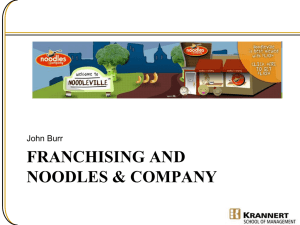
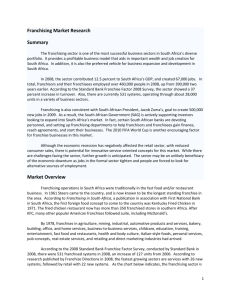
![[10]. Accessing Resources for Growth from External Sources](http://s2.studylib.net/store/data/005546472_1-5ce4dc20e590c3a704ef63f6f22a5a81-300x300.png)